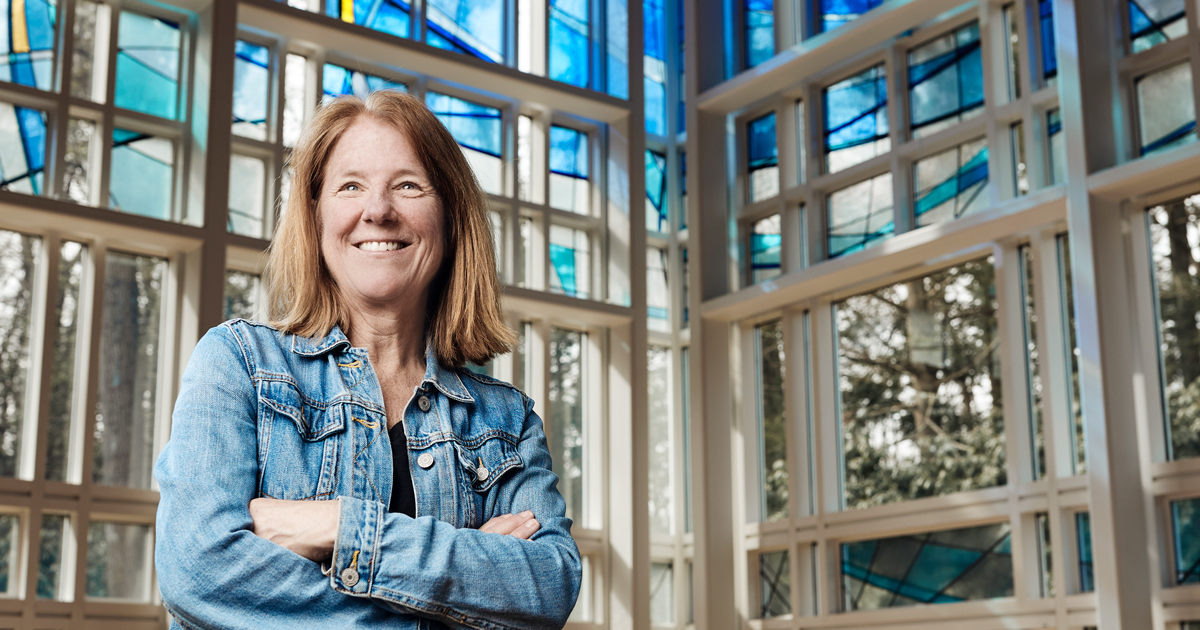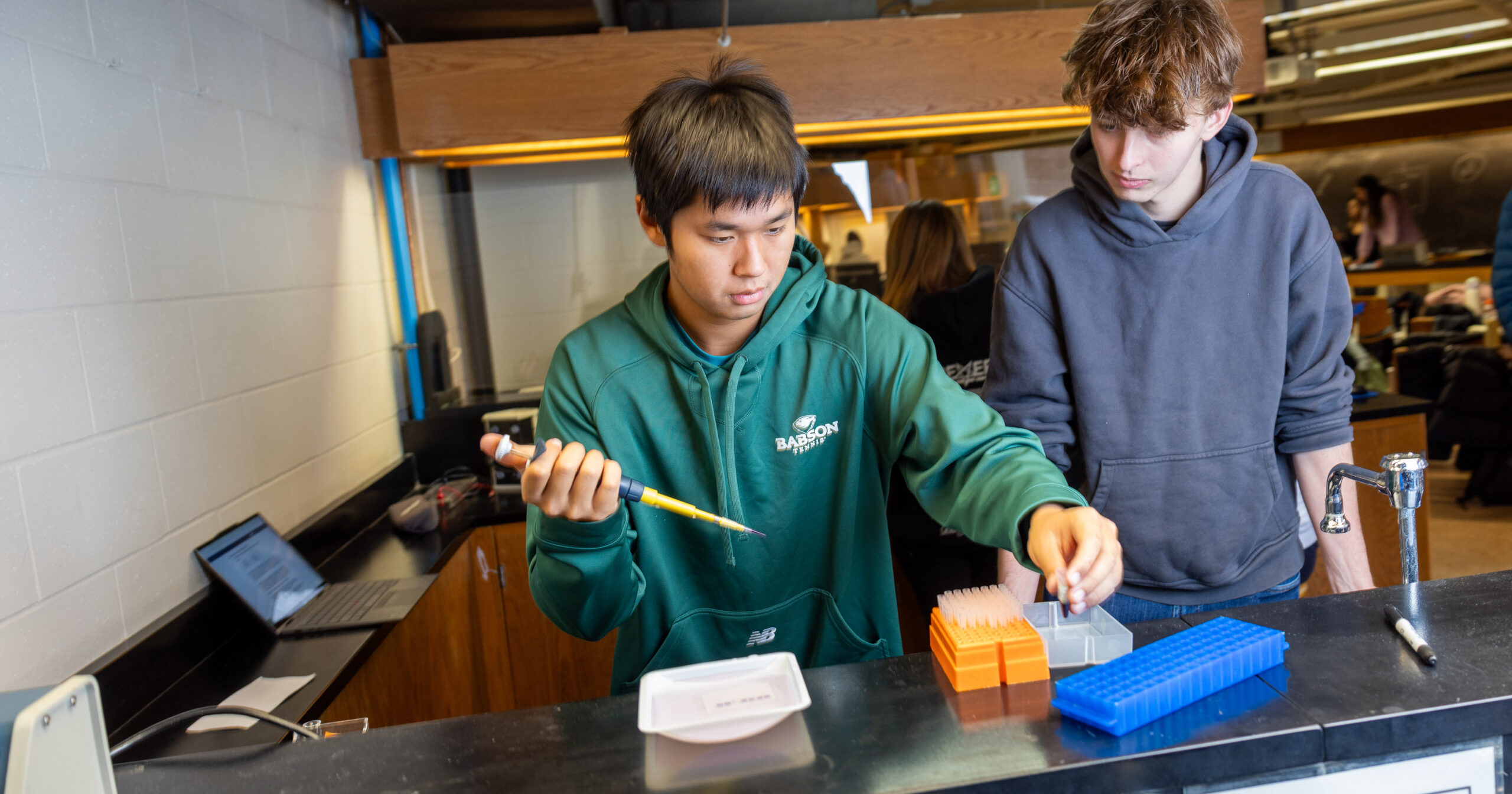People of Babson: Lisa Thomas, Director of Service and Justice Programs

From her earliest days, Lisa Thomas P’18 ’19 ’21 has been motivated to serve others, thanks to the example of her parents. “But, I don’t think I understood how important it was for me to work in a career that was aligned with my values until I was in a job that wasn’t,” she says. So, for the past two decades, Thomas has directed the service programs on campus, including, since last June, as the director of Service and Justice Programs in The Lewis Institute. During her tenure, student service has increased from 2,500 hours a year to about 40,000. She also created the Natalie Taylor Scholarship program to recognize students dedicated to service.
What were your first experiences with service?
“Growing up, it was always a part of our family experience. We’d often have servicemen or people who didn’t have anywhere else to go at our table for the holidays. Plus, I always worked at YMCA camps, so the nonprofits and the social sector was a really big part of my life. But, I don’t think I understood how important it was for me to work in a career that was aligned with my values until I was in a job that wasn’t. When I got out of school, I tried working in the hotel industry, but I quickly realized that it wasn’t the right fit. That was so important to me. I feel so fortunate that I have a job that aligns so well with what I care about and what I value.”
How has the service program at Babson evolved over the years?
“At first, there weren’t a lot of people looking at or celebrating service on campus. I made some improvements and did the best I could. It’s really evolved, especially in deepening the relationships with the nonprofits and also getting more students involved in the program. We were doing 2,500 hours of service when we first started; now we’re up to about 40,000 hours of service. We went from one service immersion trip a year; now we have four trips a year. We have more than 90 students in the CAP program who are involved every week doing some kind of service.
“The other big thing was the students who were working so hard in serving the community weren’t being recognized because they were off campus. So, that’s how the Natalie Taylor Scholar program started, and it’s pretty unique. There’s really not any program like that at other schools. Each one of them does at least 200 hours of service within the community and either does something in terms of service leadership on campus or does one of our service immersion programs.
“There also was a 10-year period where I oversaw both faith and service. Every faith has social justice at its core. So, that was a way to pull the faiths together at Babson along with the service component.”
Why is service so important for students at Babson?
“Because empathy is a big part of entrepreneurship and being an entrepreneurial leader. For the students to go out into the communities and understand the community issues—not from reading about it, or watching it on the news, but from really being there—it gives them perspective. I think the importance of getting into the communities just adds so much more impact, so much more understanding, and so much more empathy.”
“Through service, we do create social and economic value. Students who are involved with service are providing social and economic value simultaneously. I think it really does fit in with the Babson mission and the Babson students.”
What types of service projects have you participated in?
“So many. I try to go on projects with students every year both locally and globally, because, just like I ask the students, I want to stay in touch with the injustices in our community and the world. For me, the experiences are twofold: one being in the community, but then, two, just watching how engaged our students become and how much they understand and want to work in the community. The service immersion trips, because I work so closely with the students and really get to know them, are some of the highlights for me. I also appreciate the strong collaborations within the communities we serve—whether it is Habitat for Humanity in El Salvador, the Ganako School in Tanzania, or an alum in Guatemala. I am always thankful that together we create an experience that provides learning for our Babson students and impact for the communities. It is really special.”
How do the service programs relate to creating entrepreneurial leaders?
“Through service, we do create social and economic value. Students who are involved with service are providing social and economic value simultaneously. I think it really does fit in with the Babson mission and the Babson students.
“I feel so fortunate to be able to work with these students—the ones who start in FME doing a little service and then by the time they’re seniors, they’re really engaged and making some impact in the community. I also admire them, especially at Babson, where sometimes students are just talking about how they can make money. Instead, they’re thinking about how they can use their entrepreneurial skills to make an impact and to change somebody’s life.”
What issues mean the most to you personally?
“Homelessness. It’s probably from my experience with Habitat for Humanity, but I really do understand how a home can change the dynamics of a person’s life. If a child is living in a car, or living in a shelter, how do they get ready to go to school? It’s just so hard. So homelessness is something I care very deeply about, as well as education. I could go on and on, actually—there’s so many issues—but I really struggle with the fact that there are still people who are homeless. I think we should have a solution for that, because I think that with the home and that foundation and that security, it can springboard to being able to get an education and being able to get a job.”
“I also appreciate that Babson is so entrepreneurial. It inspires me to think about new and creative ideas of how we can utilize the really smart Babson students to make changes and make an impact in the community.”
What inspires you?
“It’s really the students. I also appreciate that Babson is so entrepreneurial. It inspires me to think about new and creative ideas of how we can utilize the really smart Babson students to make changes and make an impact in the community. It’s just amazing to me what they come up with and what they’re doing. I’m also inspired by our nonprofit leaders, who have dedicated their lives to serving others by raising money, advocating, and spreading awareness. I admire their stamina.”
What more can Babson do in terms of service? What’s next?
“Because experiential learning is becoming a big part of the curriculum, I think there’s a big opportunity for that. The other is more skills-based volunteering. We do sort clothes at Cradles to Crayons and we go to food shelters, and I think that is so, so important, but I think there’s also a place for students to volunteer in other ways, such as the BELA (Babson Entrepreneurial Leadership Academies) program or the VITA (Volunteer Income Tax Assistance) program. I think there’s a huge opportunity there, even just connecting students with the nonprofits we work with. I also think students taking BELA into their own communities is the next big thing.”
You’ve had such incredible experiences and you’ve made such an impact on the lives of students and people around the world. What’s left on your bucket list?
“That’s a good question, because I don’t think about myself that often. Going back to my family, my children also are pretty socially impact minded. They all are interested in education and underserved communities, so I would say, years out, I would love to support them in an endeavor and be able to help them make an impact in the world.
“My daughter is a horseback rider, and we visited a community barn in Martha’s Vineyard, so kids from all economic spheres can ride. She said, ‘Mom, this is what I want to do when I get older; I want to have a community barn so that every kid can ride.’ I think, someday, that could be something.
“My middle son said, ‘I wrote a paper about you, Mom. I wrote about how you inspire me because you do what you believe in and you do what you value.’ I said, ‘Can I see that paper? One day, when I’m feeling down, I may need to read that.’ ”




